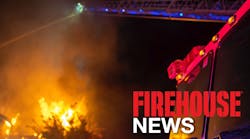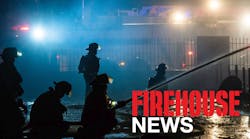There was an encouraging show of unity when 16 national fire organizations attended an informal summit conference in Washington, DC, to express their frustration over the role of the fire-rescue services within the Department of Homeland Security (DHS). The day-long meeting on Capitol Hill was called by the International Association of Fire Chiefs (IAFC) and it produced unanimous agreement on measures aimed at strengthening the federal effort to assist local fire departments in preparing for terrorist attacks.
The fire service leaders aired many of the problems they have encountered in dealing with DHS and its Office of Domestic Preparedness (ODP), which controls the funding for most first responder programs. The conference adopted five policy goals, as follows:
Goal 1 – America’s fire services must be represented by fire chiefs and other senior fire service officials within the office of the Secretary of Homeland Security and in key positions throughout the department.
This is intended to place experienced fire officers in upper-level management positions within DHS, where they can be involved in decision making and in formulating policies that directly affect the nation’s firefighters. It is especially important that they have access to DHS Secretary Michael Chertoff, so that he can benefit from their advice and be aware of problems facing the first responders. As it stands today, there is no one in that position.
Goal 2 – The U.S. Fire Administration (USFA) must occupy a key position and function in a comprehensive role within DHS proportionate to the responsibilities of the fire services in responding to incidents of terrorism and all hazards events.
DHS has failed to accept the doctrine that preparing for “all hazards” also prepares a fire department to meet the threat of terrorism. It has relegated the Fire Administration to a minor role in the anti-terrorism effort. The fire service wants USFA elevated to a level where it initiates and supervises the fire programs. The goal is to put federal support for fire departments in the hands of experienced officials who have first-hand knowledge of fire-rescue operations.
Goal 3 – The Office of Management and Budget (OMB) and the Department of Homeland Security need to recognize and designate the U.S. Fire Administration and the National Fire Academy as being “homeland security critical” in the federal budgeting process.
A local fire department is the lead agency in the response to every type of disaster, including terrorist attacks, and the only one that can reach the scene in time to save lives. Yet, OMB and DHS do not consider the USFA and the Fire Academy to be “critical” components of homeland security. This type of thinking is totally illogical, but it has a direct effect on federal budget priorities and must be changed. If the agency representing the nation’s firefighters is “not critical to homeland security,” what is?
Goal 4 – The U.S. Fire Administration and the National Fire Academy must be fully funded to authorized levels to support the ongoing mission to reflect contemporary issues and community risks.
R. David Paulison, the USFA administrator, made a presentation at the conference to show that the budget cuts for USFA and the Fire Academy have not been as severe as rumors and media reports have made them out to be. Nevertheless, programs and classes have been curtailed and there seems to be a great deal of confusion over the figures. However, in this year’s battle of the budget, hardly any non-military agency is going to get the full amount of money Congress authorized and the fire programs are no exception – unless there’s another terrorist attack.
Goal 5 – To ensure the most effective utilization of training resources, the Department of Homeland Security should be required to work more closely with the National Fire Academy and state and local fire training academies regarding the use of curriculum and the delivery system for terrorism response training.
This is aimed at overcoming the problem of ODP refusing to recognize state and local fire training facilities and instructors as qualified to deliver advanced anti-terrorism training. There is no reason why they cannot train firefighters to meet national standards in any fire-rescue skill; they’ve only been doing it for more than 100 years.
It’s worth noting that the conference carefully labeled its five points as “goals” rather than “demands.” There’s a big difference and no one wants a confrontation, but they do want to be heard and they want some things to change inside DHS. The next step is to seek a meeting with Secretary Chertoff, where fire service leaders can present their recommendations and, hopefully, start a dialogue that may help solve some of these problems.





